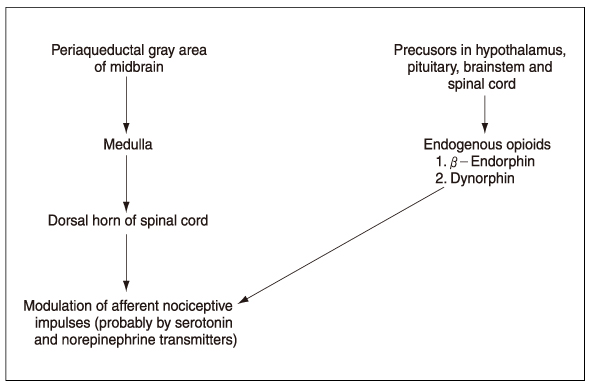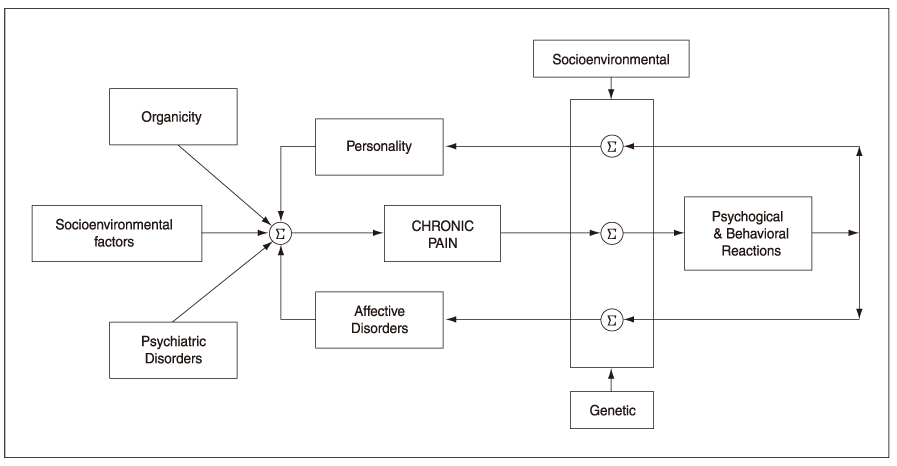J Korean Med Assoc.
2006 Sep;49(9):825-834. 10.5124/jkma.2006.49.9.825.
Psychiatric Treatment of Chronic Pain
- Affiliations
-
- 1Department of Psychiatry, The Catholic University of Korea College of Medicine, Korea. saintnp@chol.com
- KMID: 2137823
- DOI: http://doi.org/10.5124/jkma.2006.49.9.825
Abstract
- Although pain is not only a physical but also an emotional and cognitive distress, psychiatric management of pain has commonly been overlooked. In this article the author will review the psychiatric assessment and treatment of patients with chronic pain. Pain is not a simple sensory process but a complex perception involving higher levels of the central nervous system, emotional states, and highorder mental processes. Thus the psychosocial aspect should be underscored in patients with chronic pain, and a multidisciplinary approach is necessary in the treatment of chronic pain. Tricyclic antidepressants are most widely used and have proven effective in patients with chronic pain. Anticonvulsants/mood stabilizers, anxiolytics, antipsychotics, and opioid analgesics are beneficial in some cases. Non-Pharmacological and psychological therapy of chronic pain includes cognitive-behavioral therapy, relaxation techniques, biofeedback, hypnosis, psychotherapy, and family therapy. New psychotropic agents and various psychological therapies need to be developed and be proven to be effective and tolerable in patients with chronic pain through well-controlled and long-term follow-up studies. Psychiatric treatments, both pharmacological and non-pharmacological, are helpful in patents with chronic pain.
Keyword
MeSH Terms
-
Analgesics, Opioid
Anti-Anxiety Agents
Antidepressive Agents, Tricyclic
Antipsychotic Agents
Biofeedback, Psychology
Central Nervous System
Chronic Pain*
Family Therapy
Humans
Hypnosis
Mental Processes
Psychotherapy
Relaxation Therapy
Analgesics, Opioid
Anti-Anxiety Agents
Antidepressive Agents, Tricyclic
Antipsychotic Agents
Figure
Reference
-
1. Bonica JJ. Evolution and current status of pain programs. J Pain Symptom Manage. 1990. 5:368–374.
Article2. Bonica JJ. Ng LKY, editor. Preface. New approaches to treatment of chronic pain: A review of multidisciplinary pain clinics and pain centers. 1981. Washington: NIDA;7–10.3. Wise MG, Rundell JR. Textbook of consultation-liaison psychiatry. 1996. 2nd ed. American Psychiatric Publishing Inc;989–1013.4. Merskey H, Bogduk N, editors. International association for the study of pain classification of chronic pain. 1994. 2nd ed. Seattle: IASP Press.5. Osterweise M, Kleinman A, Mechanic D, editors. Pain and disability. 1987. Washington: National Academy Press;13.6. Hales RE, Yudofsky SC, editors. The American Publishing Textbook of Psychiatry. 2005. 4th ed. Washington: American Psychiatric Publishing Inc;1023–1040.7. Merskey H, Nindblom U, Mumford R. Pain terms: a current list with definitions and notes on usage. Pain. Suppl. 215–221.
Article8. Sadock BJ, Sadock VA, editors. Synopsis of psychiatry. 2003. 9th ed. Philadelphia: Lippincott Williams & Wilkins;1342.9. Krishnan KRR, France RD, Urban BJ. France RD, Krishnan KRR, editors. Systems approach to chronic pain syndromes. Chronic pain. 1988. Washington: American Psychiatric Press;16–27.10. Geisser ME, Roth RS, Robinson ME. Assessing depression among persons with chronic pain using the Center for Epidemiological Studies-Depression Scale and the Beck Depression Inventory: a comparative analysis. Clin J Pain. 1997. 13:163–170.
Article11. Krishnan KRR, France RD, Pelton S. Chronic pain and depression: classification of depression in chronic low back pain patients. Pain. 1985. 22:279–287.
Article12. American Psychiatric Association. Diagnostic and Statistical Manual of Mental Disorders. 2000. 4th ed. Washington: American Psychiatric Association;Text revision.13. Bouckoms AJ, Hackett TP. he pain patient: evaluation and treatment. Massachusetts General Hospital handbook of general hospital psychiatry. 1991. 3rd ed. Boston: CV Mosby;39–68.14. Stoudemire A, Fogel F, Greenberg D, editors. Psychiatric care of the medical patient. 2000. 2nd ed. New York: Oxford University Press.15. France RD, Krishnan KRR. France RD, Krishnan KRR, editors. Pain in psychiatric disorders. Chronic pain. 1988. Washington: American Psychiatric Press;117–141.16. Clouse RE. Antidepressants for functional gastrointestinal syndromes. Dig Dis Sci. 1994. 39:2352–2363.
Article17. King RD, Turk DC, Rudy TE. The West Haven-Yale Multidimensional Pain Inventory (WHYMPI). Pain. 1995. 23:345–356.
Article18. Max MB. Fields HL, Liebeskind JC, editors. Antidepressants as analgesics. Progress in Pain Research and Management. 1994. 1. Seattle: IASP Press;229–246.19. Saper JR. Diagnosis and symptomatic treatment of migraine. Headache. 1997. 37:Suppl 1. 1–14.20. Smith AJ. The analgesic effects of selective serotonin reuptake inhibitors. J Psychopharmacol. 1998. 12:407–413.
Article21. Ansari A. The efficacy of newer antidepressants in the treatment of chronic pain: a review of current literature. Harv Rev Psychiatry. 2000. 7:257–277.
Article22. MacQuay H, Carroll D, Jadad AR, et al. Anticonvulsant drugs for management of pain: a systemic review. BMJ. 1995. 311:1047–1052.23. Backonja MM. Anticonvulsants(antineuropathics) for neuropathic pain syndromes. Clin J Pain. 2000. 16:2 Suppl. 67–72.24. Dellemijn PLI, Fields HL. Do benzodiazepines have a role in chronic pain management? Pain. 1994. 57:137–152.
Article25. Gear RW, Miaskowki C, Heller PH, Paul SM, Gordon NC, Levine JD. Benzodiazepine mediated antagonism of opioid analgesia. Pain. 1997. 71:25–29.
Article26. Monks R. Bonica JJ, editor. Psychotropic drugs. The Management of Pain. 1990. Philadelphia: Lea & Febiger;1676–1689.
Article27. Lee KH. Psychiatric management of chronic pain. J Korean Soc Biol Ther Psychiatry. 2003. 9:146–153.28. Fordyee W. Behavioral methods for chronic pain and illness. 1976. St. Louis: CV Mosby.29. Fordyee W. The behavioral management of chronic pain: a response to critics. Pain. 1985. 22:113–125.
Article30. Turner JA, Chapman CR. Psychological interventions for chronic pain: a critical review I relaxation training and biofeedback. Pain. 1982. 12:1–21.
Article31. Turner JA, Chapman CR. Psychological interventions for chronic pain: a critical review II. operant conditioning, hypnosis, and cognitive behavioral therapy. Pain. 1982. 12:23–46.
Article32. Keefe FJ, Williams DA. A comparison of coping strategies in chronic pain patients in different age groups. J Gerontol. 1990. 45:161–165.
Article




